The franchise of Assassin’s Creed has a long and impressive history that spans nearly two decades. It began as a modest project and has now evolved into a massive franchise, offering expansive open worlds and extensive campaigns that can occupy players for hundreds of hours.
While it’s widely known that there are numerous Assassin’s Creed games, it can be confusing to determine the correct order to play them in. For gamers who want to experience the entire collection of Assassin’s Creed games, there are two options available.
They can choose to play the games in the order they were released, or for a more immersive experience, they can follow the franchise in chronological order. Below, we have prepared a guide to help you complete the series, regardless of which approach you choose.
You Might Also Like:
- Resident Evil Games in Order
- God of War Games in Order
- GTA Games in Order
- Call of Duty Games in Order
How Many Assassin’s Creed Games Are There?
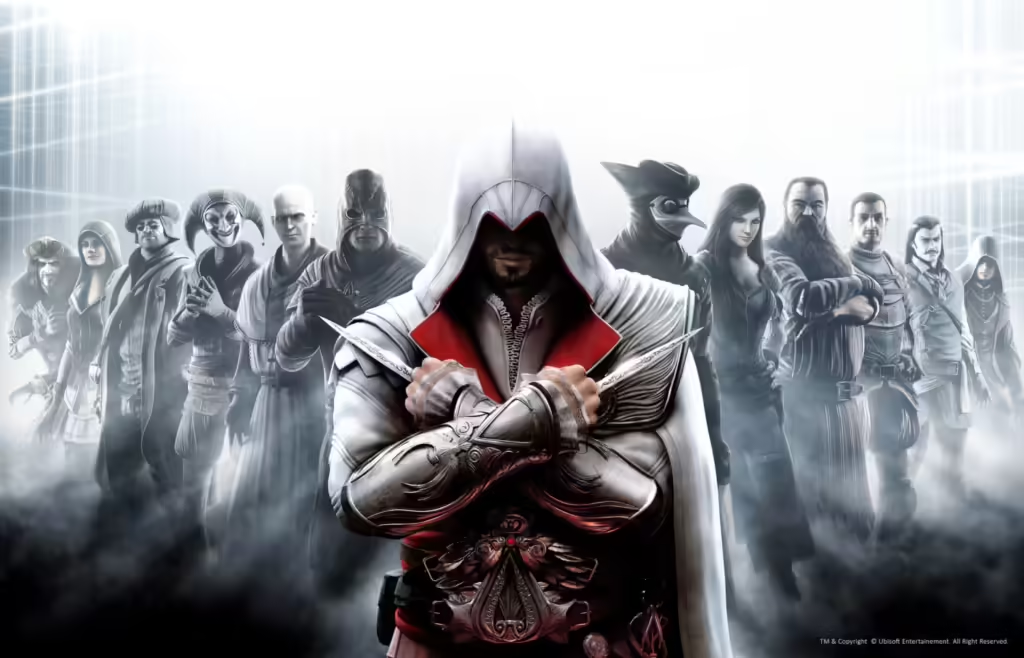
At present, there are a total of 13 main series Assassin’s Creed games along with 17 additional spinoff games. Apart from the digital realm, there is a board game based on Assassin’s Creed, as well as an upcoming Netflix TV series based on the popular franchise.
How to play the Assassin’s Creed games in release date order
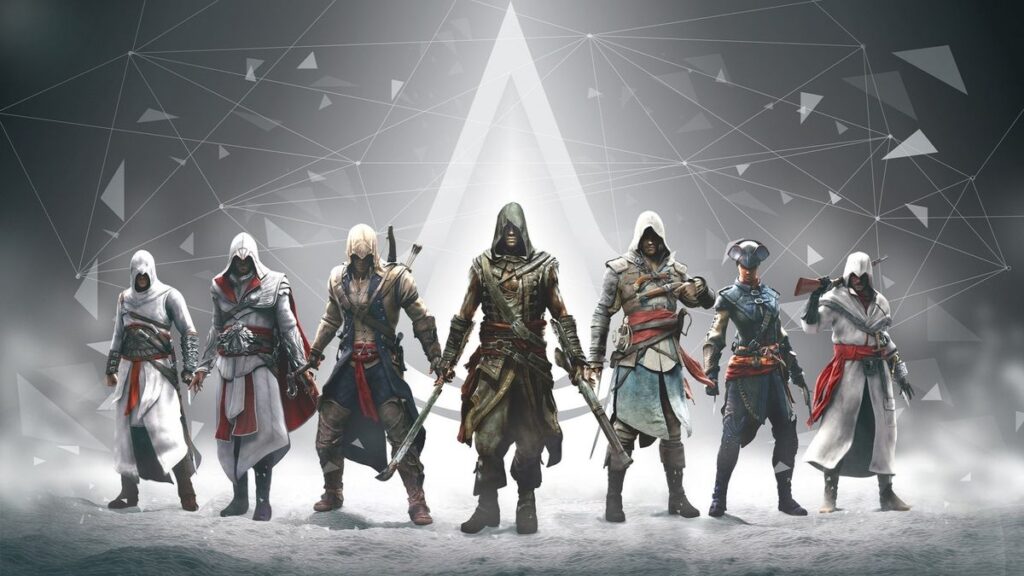
The Assassin’s Creed series, created by Ubisoft, first started in 2007 with the release of the original Assassin’s Creed game on PC, Xbox 360, and PS3. Presently, the series is still thriving and is set to continue with the release of Assassin’s Creed Mirage in 2023.
Here is the complete list of Assassin’s Creed games in release date order:
- Assassin’s Creed (2007 | PC, PS3, Xbox 360)
- Assassin’s Creed: Altaïr’s Chronicles (2008 | DS)
- Assassin’s Creed II (2009 | PC, PS3, Xbox 360)
- Assassin’s Creed: Bloodlines (2009 | PSP)
- Assassin’s Creed II: Discovery (2009 | DS)
- Assassin’s Creed: Brotherhood (2010 | PC, PS3, Xbox 360)
- Assassin’s Creed: Revelations (2011 | PC, PS3, Xbox 360)
- Assassin’s Creed III (2012 | PC, PS3, Xbox 360, Wii U)
- Assassin’s Creed III: Liberation (2012 | PS Vita)
- Assassin’s Creed IV: Black Flag (2013 | PC, PS3, Xbox 360, Wii U)
- Assassin’s Creed: Freedom Cry (2014 | PC, PS3, Xbox 360, Wii U)
- Assassin’s Creed Rogue (2014 | PC, PS3, Xbox 360)
- Assassin’s Creed Unity (2014 | PC, PS4, Xbox One)
- Assassin’s Creed Syndicate (2015 | PC, PS4, Xbox One)
- Assassin’s Creed Chronicles: China (2015 | PC, PS4, Xbox One)
- Assassin’s Creed Chronicles: India (2016 | PC, PS4, Xbox One)
- Assassin’s Creed Chronicles: Russia (2016 | PC, PS4, Xbox One)
- Assassin’s Creed Chronicles collection (2016 | PC, PS4, Xbox One, PS Vita)
- Assassin’s Creed Identity (2016 | iOS, Android)
- Assassin’s Creed Origins (2017 | PC, PS4, Xbox One)
- Assassin’s Creed Odyssey (2018 | PC, PS4, Xbox One)
- Assassin’s Creed Valhalla (2020 | PC, PS4, PS5, Xbox One, Xbox Series X/S)
- Assassin’s Creed Mirage (2023 | PC, PS4, PS5, Xbox One, Xbox Series X/S)
- Assassin’s Creed: Codename Jade (2023 | smartphones)
- Assassin’s Creed Nexus VR (2024 | applicable VR headsets)
- Assassin’s Creed Codename Red (TBC)
The Assassin’s Creed Games in Chronological Order
Playing the Assassin’s Creed games chronologically means exploring them through their historical timeline. This guide will help you explore each game and understand how it fits into the larger story, making it less of a playing guide and more of a fascinating journey through history.
1. Assassin’s Creed Odyssey (431 B.C.–422 B.C.)
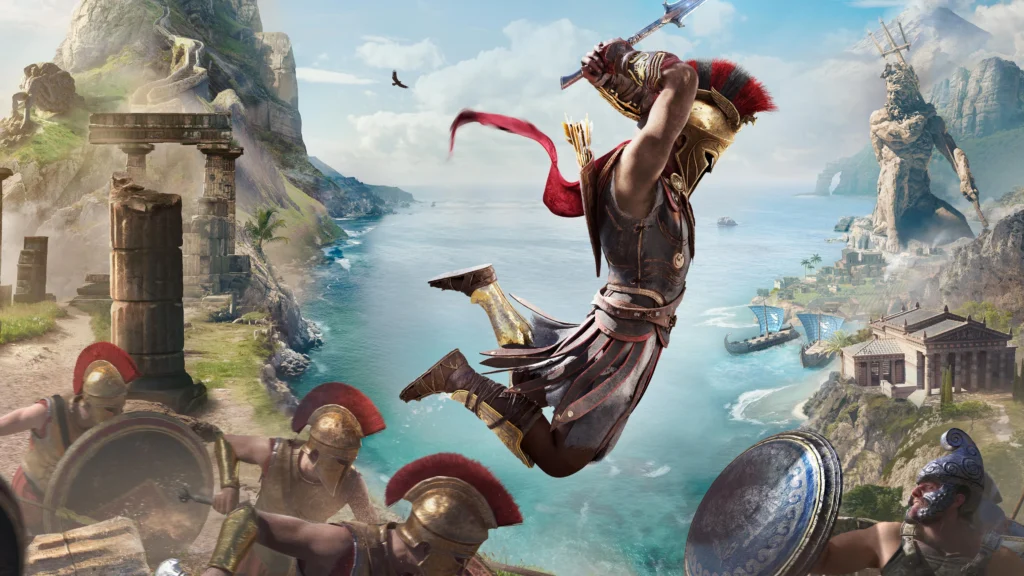
Assassin’s Creed Odyssey is a game that takes place nearly 400 years before any other mainline game in the series. It builds upon the RPG aspects introduced in Origins and transitions the gameplay from stealth-based action to an open-world RPG experience.
In the Assassin’s Creed series, you have the opportunity to assume the role of either Cassandra or Alexios. These characters are the descendants of King Leonidas I of Sparta.
The game Odyssey takes place during the Peloponnesian War, a conflict between Athens and Sparta. Throughout the game, you will encounter important figures from Greek history such as Hippocrates, Socrates, and Plato.
The game incorporates the historical context of the period and blends it with mythical elements. It introduces legendary creatures like the Sphinx, Cyclops, and Medusa.
Odyssey takes place in a time before the establishment of the Assassin and Templar organizations, but it does include an important artifact known as the Spear of Leonidas, which is a Piece of Eden.
2. Assassin’s Creed Origins (49 B.C.–44 B.C.)
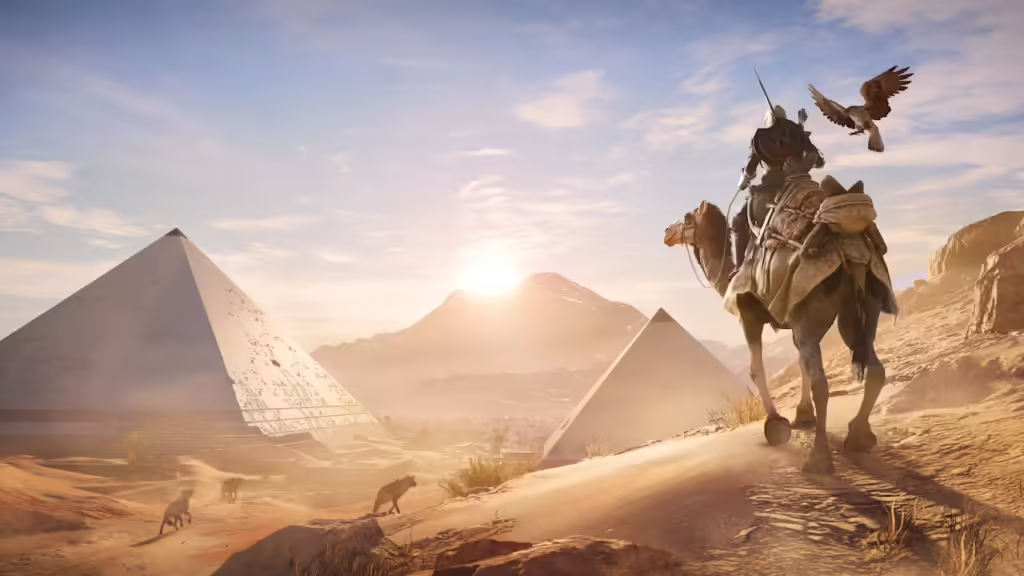
From 2009 to 2015, Ubisoft launched a new installment of the Assassin’s Creed game series annually. However, they decided to take a break for a year. In 2017, they made a comeback with Assassin’s Creed Origins, which marked a soft reset for the franchise. This game also introduced role-playing game (RPG)
Assassin’s Creed Origins takes place in Ancient Egypt, specifically during the reigns of Ptolemy XIII and Cleopatra. While the game is primarily set in Egypt, it also draws inspiration from Rome and Julius Caesar’s rule.
Similar to other Assassin’s Creed stories, Origins starts off as a tale of vengeance but evolves into a larger narrative of political conspiracy. The death of Bayek and Aya’s son becomes the driving force behind their journey.
However, as the story progresses, they discover a precursor to the Templar organization known as the Order of the Ancients. Eventually, they establish the Hidden Ones, which is the first version of the Assassins.
In terms of the overall narrative, the contemporary storyline features a character named Layla Hassan, who takes on the role of the main protagonist in Assassin’s Creed Origins, Odyssey, and Valhalla.
3. Assassin’s Creed Mirage (861–???)
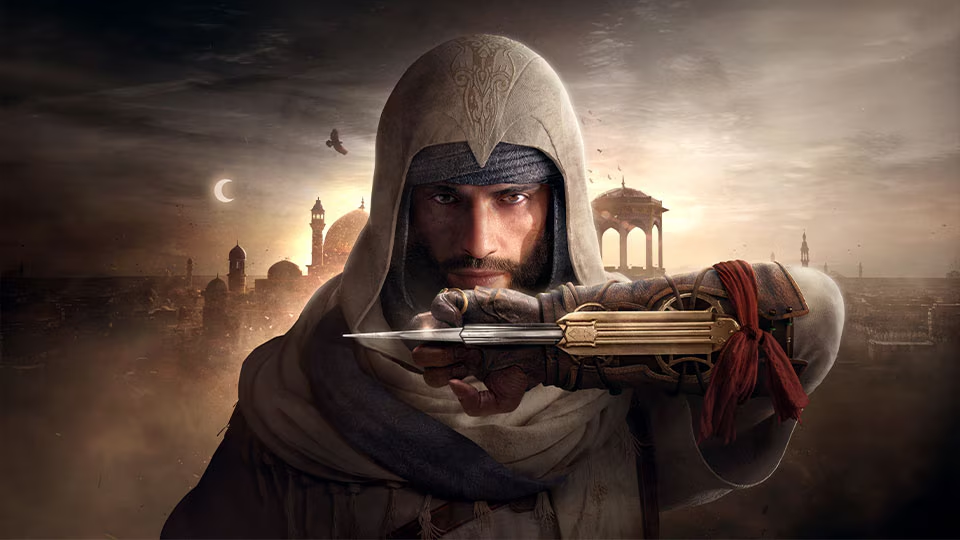
Scheduled for release in 2023, Assassin’s Creed Mirage is the upcoming installment in the popular video game series. Unlike its predecessors, Mirage deviates from the traditional full-priced open-world RPG format and instead offers a $50 USD stealth-focused adventure.
It is specifically crafted as a tribute to the initial Assassin’s Creed games, emphasizing their essence. Ubisoft characterizes Mirage as a more concise and story-centered game compared to the recent entries in the series.
The game called Assassin’s Creed Mirage focuses on the character Basim Ibn Ishaq, a teenager of 17 years old, who is a street thief and experiences disturbing visions. This character will later play a crucial part in Assassin’s Creed Valhalla.
Mirage will narrate Basim’s journey as he escapes from Baghdad with the help of his mentor Roshan, as they make their way to the stronghold of Alamut, where the Hidden Ones are based.
Mirage, unlike the other games in the Assassin’s Creed series, does not focus heavily on the present-day storyline. For more information, you can check out our comprehensive review of Assassin’s Creed Mirage.
4. Assassin’s Creed Valhalla (872–878)
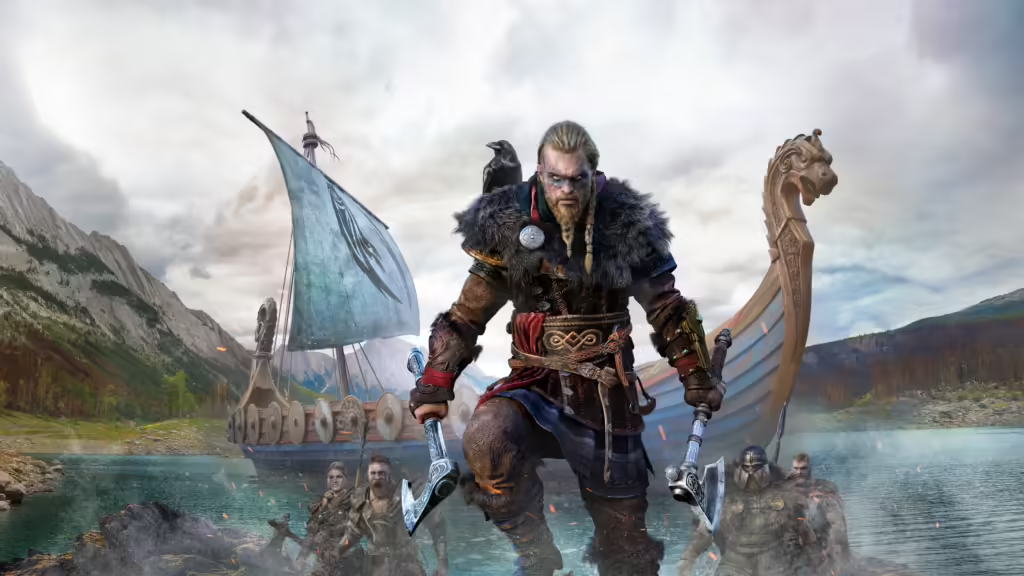
The game Assassin’s Creed Valhalla takes players on a journey into Norse history and mythology. It is the largest game in the series, with the main story taking an average of 60 hours to complete, making it 15 hours longer than the previous biggest game, Odyssey.
Similar to Odyssey, Valhalla seamlessly combines historical events with mythological elements, featuring real-life characters like King Harald Fairhair, King Aelfred the Great, and Rollo, as well as mythological figures including Fenrir and Odin.
The game carries on the ongoing rivalry between the Hidden Ones and the Order of the Ancients, while also focusing on the personal journey of Eivor and their clan as they leave the barren lands of Norway and settle in the fertile territories of England. The modern-day narrative appears to wrap up the three-game storyline centered around Layla Hassan.
5. Assassin’s Creed (1191)
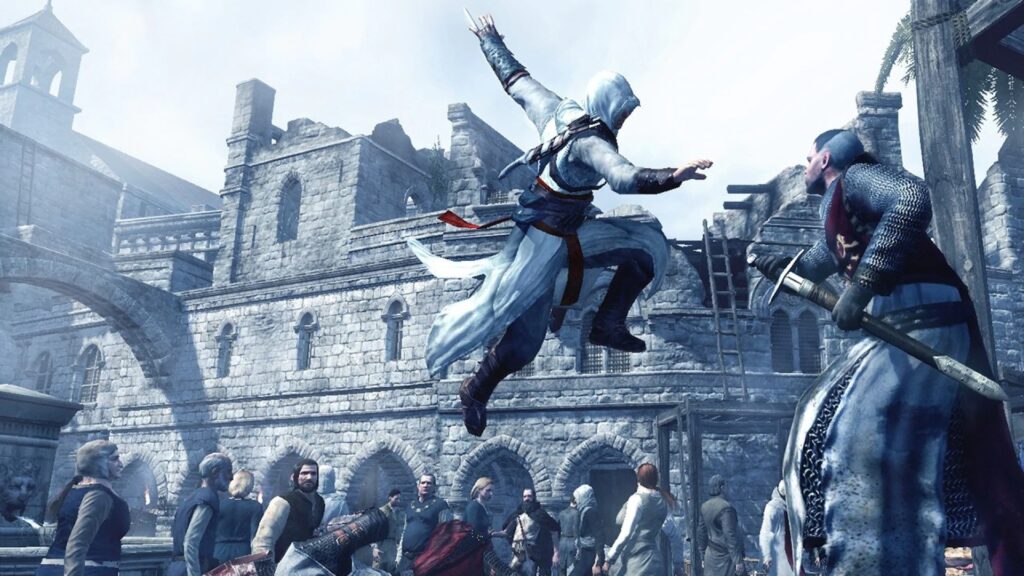
The initial installment of the Assassin’s Creed series, set 300 years after the events of Valhalla, introduces Altair Ibn’La-Ahad as the original main character.
This game played a crucial role in establishing the foundation for the franchise’s subsequent 15 years of triumph, as it introduced key gameplay mechanics such as climbing and assassinations.
Additionally, it laid the groundwork for the time-traveling Assassin-Templar storyline that would become a prominent aspect of the series.
The Assassin’s Creed games follow a specific order, introducing important narrative elements such as the Pieces of Eden and the Animus. The Animus is a device within the game’s universe that enables the protagonist in the present day to relive the memories of their historical ancestors through their DNA.
In one of the games, Altair embarks on a mission to hunt down nine Templars during the Third Crusade. The game also introduces Desmond Miles and explores the ongoing conflict between the modern-day Assassins and Templars, which continues in Assassin’s Creed III.
6. Assassin’s Creed II (1476–1499)
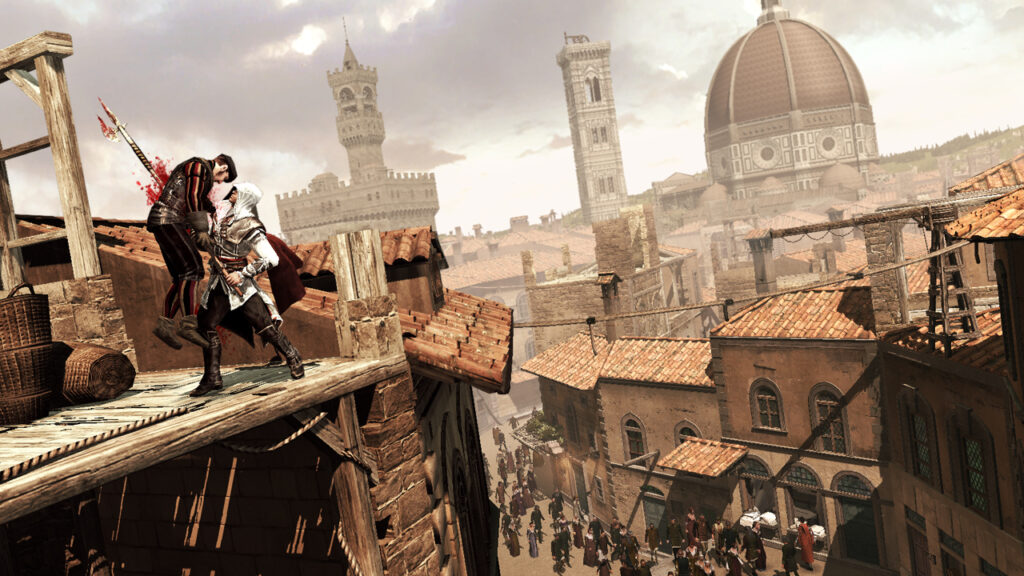
The second installment in the Assassin’s Creed series, Assassin’s Creed 2, introduced a protagonist named Ezio Auditore da Firenze. Ezio’s story spanned from the release of AC II in 2009 until AC: Revelations in 2011, making him a beloved character among fans of the franchise.
In his quest for revenge, Ezio is determined to avenge the tragic deaths of his father and brother. However, his pursuit of vengeance uncovers a larger conspiracy, thrusting him into the midst of a fierce battle between the Assassins and Templars.
Assassin’s Creed II transports players to various locations in Italy, including Florence and the Vatican. Along the way, Ezio encounters renowned historical figures such as Leonardo Da Vinci, Niccolo Machiavelli, and Pope Alexander VI. Currently, Desmond embarks on his journey with the Assassins in the modern era.
7. Assassin’s Creed: Brotherhood (1499–1507)
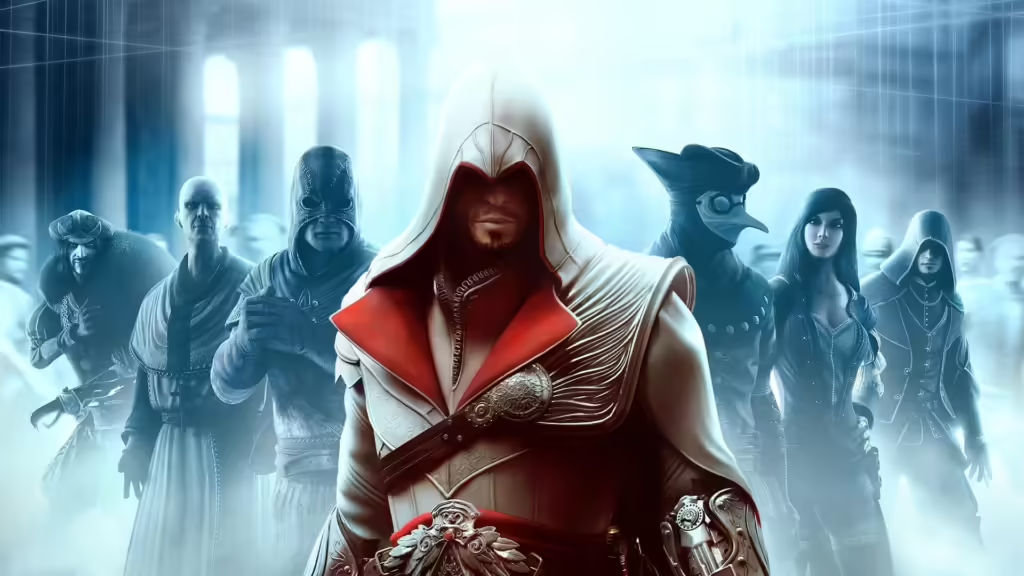
The game Assassin’s Creed Brotherhood carries on the story of Assassin’s Creed II, both in the historical and modern-day narratives. The events that unfold in Assassin’s Creed II lead to the emergence of a new enemy for the protagonist, Ezio.
He sets out on a quest for vengeance while simultaneously working towards reviving the weakened Assassins Guild in Rome and recovering the powerful artifact known as the Apple of Eden.
In the current era, Desmond and the contemporary Assassins travel to Italy with the objective of finding the Apple of Eden, a powerful artifact that has the potential to aid them in thwarting the predicted apocalypse.
8. Assassin’s Creed: Revelations (1511–1512)
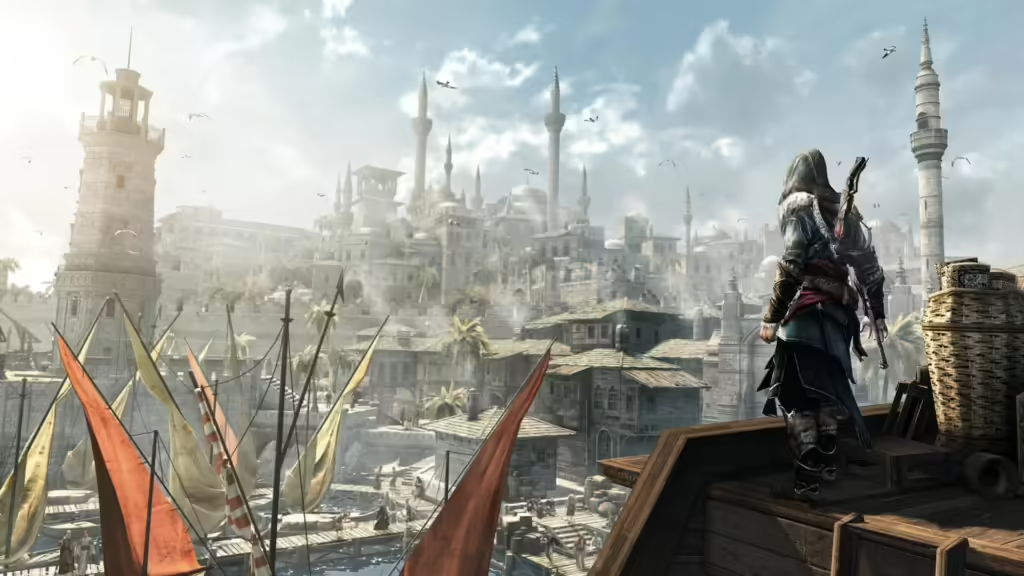
In the final installment of the Ezio trilogy, the story of the Italian assassin is intertwined with that of his predecessor, Altair. A more experienced Ezio embarks on a journey to Constantinople, hoping to find Altair’s secret library rumored to hold priceless knowledge.
In Constantinople, Ezio’s mission is to locate the keys required to unlock the library, with each key representing a significant moment in Altair’s life. Through Assassin’s Creed Revelations, we ultimately discover Ezio’s crucial part in the broader narrative of the Assassin’s Creed series.
Currently, Desmond is in a comatose state and is stuck inside the Animus. He collaborates with a previous user of the Animus to find a way out of “the Black Room” and regain consciousness.
9. Assassin’s Creed IV: Black Flag (1715–1722)
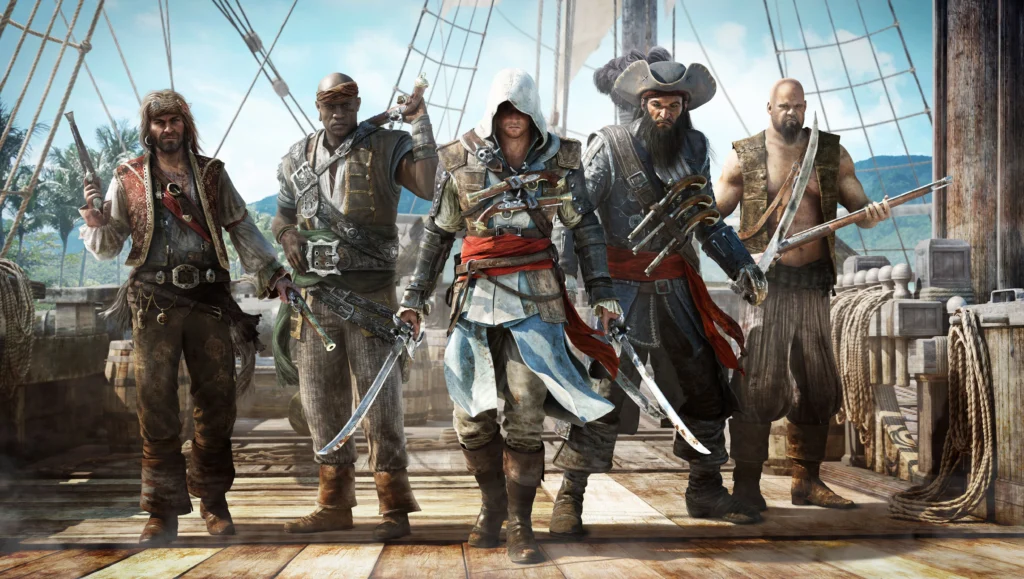
The Assassin’s Creed 4: Black Flag game is most notable for its inclusion of naval gameplay, which was a first for the series. The game takes place two hundred years after the events of Ezio’s trilogy and approximately four decades before the release of Assassin’s Creed III.
Assassin’s Creed Black Flag follows the story of Edward Kenway, a pirate in the 18th century who is also the grandfather of Connor Kenway from Assassin’s Creed III. The game includes well-known historical pirates like Blackbeard, Benjamin Hornigold, and Mary Read.
Additionally, it introduces Adéwalé, the main character of the standalone spinoff Freedom Cry, which was originally a DLC. As the story unfolds, Edward unintentionally kills an Assassin and becomes entangled in the war between Assassins and Templars. He embarks on a mission to uncover a hidden First Civilization location called The Observatory.
10. Assassin’s Creed Rogue (1752–1760)
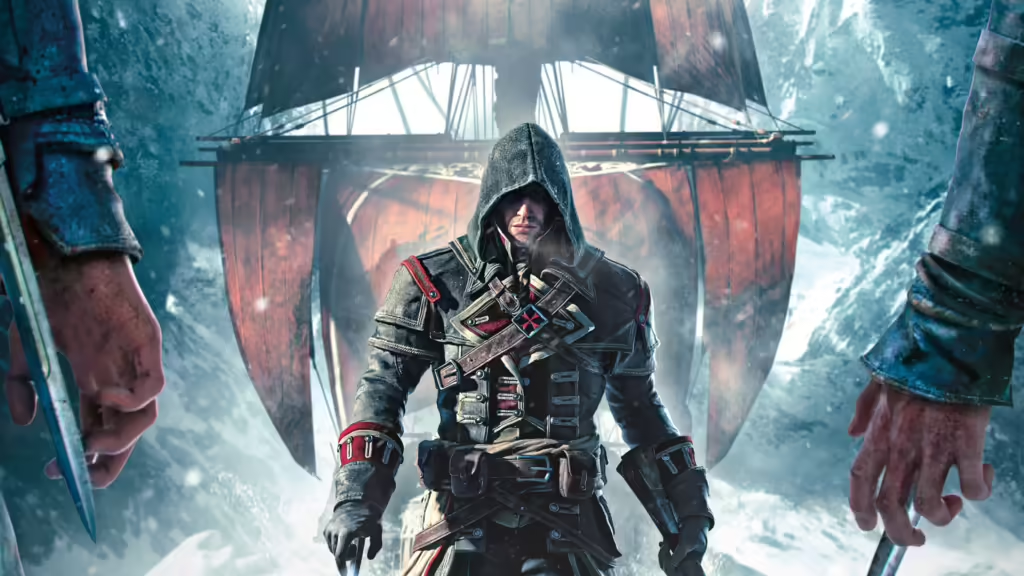
Assassin’s Creed Rogue is an important game in the Assassin’s Creed series that helps connect the narratives of Assassin’s Creed III and Assassin’s Creed IV. The game follows the journey of Shay Patrick Cormac, a former Irish-American Assassin who becomes a Templar.
Shay’s mission in the game is to track down a powerful artifact known as the Piece of Eden. Throughout the story, players will also encounter Haytham Kenway, the Templar Grand Master who is the son of Edward Kenway
Currently, you assume the role of a different employee at Abstergo, known as “Numbskull,” who carries out tasks on behalf of the contemporary Templars.
11. Assassin’s Creed III (1754–1783)
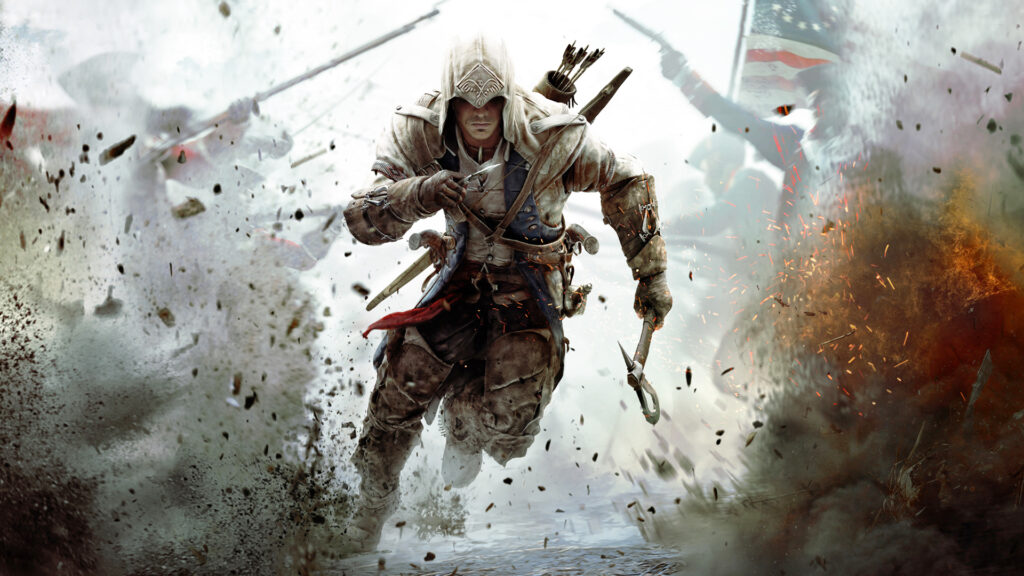
The storyline of Assassin’s Creed 3 takes place in 1754 and revolves around the character Haythem Kenway. However, the game truly begins with Haythem’s son, Ratonhnhaké:ton, also known as Connor.
Set in the backdrop of the American Revolution, Connor’s primary goal is to safeguard his tribe from the effects of the war and prevent the Templars from gaining control over the First Civilization’s Grand Temple.
The Assassin’s Creed III game features various prominent historical figures such as George Washington, Sam Adams, Charles Lee, and Benjamin Franklin. In the present-day storyline, the game concludes Desmond’s journey as he joins forces with other modern-day Assassins to safeguard against the predicted apocalypse on December 21, 2012.
12. Assassins Creed Unity (1789–1794)
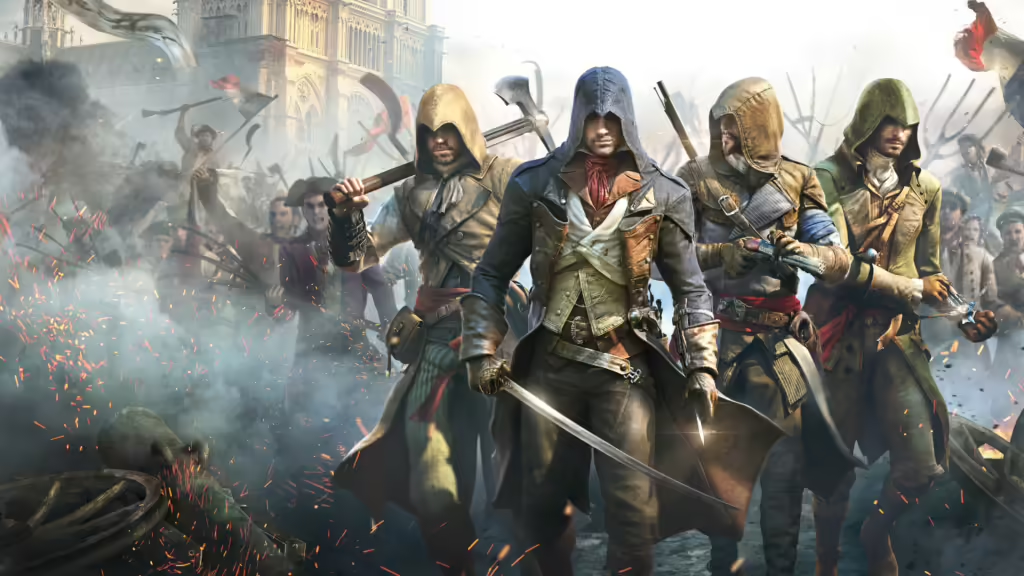
The main setting of Assassin’s Creed Unity is the French Revolution from 1789 to 1794, although there are scenes that take place in different time periods ranging from 1307 to the mid-1900s.
The protagonist, Arno Dorian, is a French Assassin who gets caught up in the ongoing conflict between the Assassins and the Templars while seeking revenge.
Notable historical figures that appear in the game include Napoléon Bonaparte, Marquis de Sade, and King Louis XVI.
The modern-day storyline in Unity is not very memorable because it focuses more on cutscenes rather than gameplay. This storyline is not very important to the overall narrative of the Assassin’s Creed series.
In Unity, you take on the role of a gamer who is playing Helix, a gaming software developed by Abstergo that is powered by the Animus. The purpose of Helix is to spread Templar propaganda and gather DNA from unsuspecting users.
13. Assassin’s Creed Syndicate (1868)
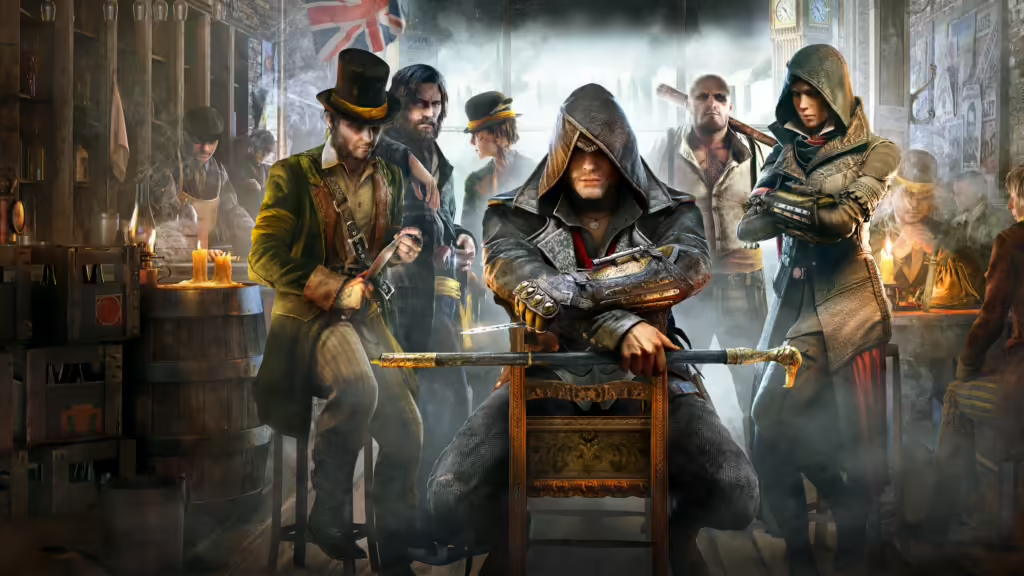
The game Assassin’s Creed Syndicate features two main characters, Jacob and Evie Frye, who are twin Assassins. They are on a mission to free London from the control of the Templars and find a powerful artifact called the Piece of Eden.
Although there is a side mission set during World War I, the majority of the game takes place in 1868. Throughout the game, players will encounter notable historical figures such as Alexander Graham Bell, Charles Darwin, and even Winston Churchill in a future sequence.
The modern-day character from the previous game, Unity, also appears in Syndicate and is working alongside the Assassins to locate another Piece of Eden in London.




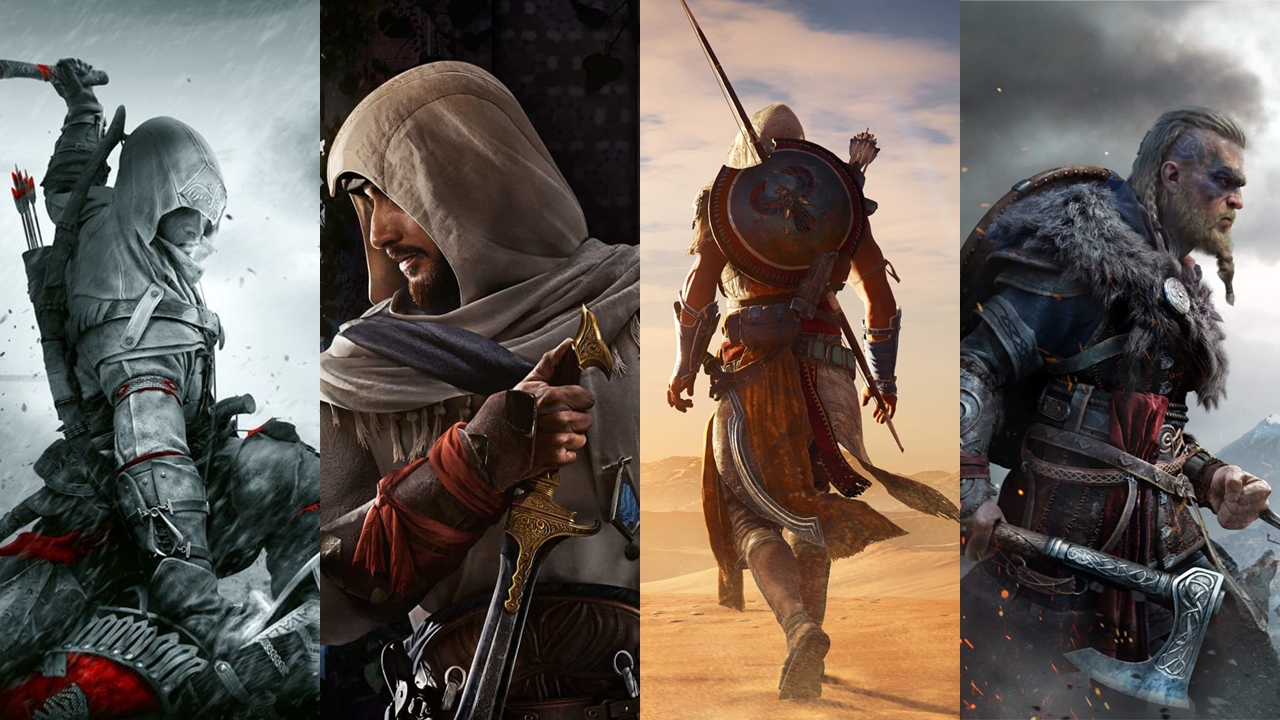





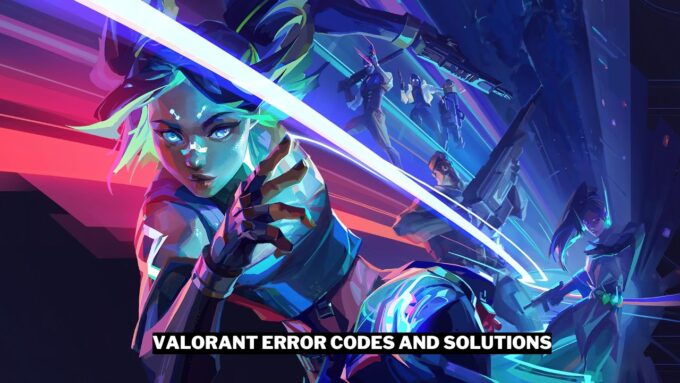


Leave a comment